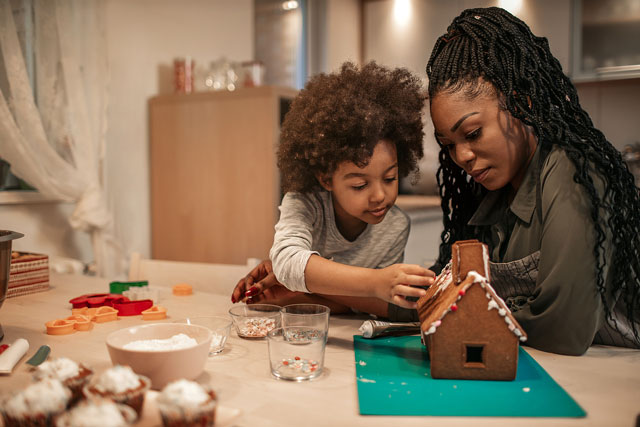What We Know
It is very likely that our wintertime or holiday traditions will look different this year. Now that we are several months into the COVID-19 pandemic, we’ve all gotten somewhat accustomed to canceled events, changes in expectations, and disappointments. My young children have managed the disappointment of a canceled family vacation, a switch to remote learning, and fewer chances for community sports and recreation. The big losses can really hurt, but the small ones can as well. A postponed Saturday playdate can sting just as much as a canceled birthday party. Children’s responses can vary widely. One child may recover from a disappointment within a few minutes, while another may remain upset for hours or days.
What We Can Do: Plan for the Holiday Season on the Horizon
Many families participate in holiday or seasonal traditions and celebrations near the end of the calendar year. Your family may have traditions centered around Christmas, Hanukkah, Kwanza, or the winter solstice, or you may simply enjoy gathering with friends and family as the year draws to a close. We all know that this year won’t be the same as previous years, but here are three tips to make it more manageable.
1. Consider how your children view your traditions
Talk to your children about what they remember about the holidays in years past. Ask open-ended questions such as, “Tell me what you remember about Christmas last year,” or “What are your favorite things about our Hanukkah celebration?” Very young children may not remember everything about your family traditions, or they may have different perspectives than adults or older siblings. For example, as an adult, you may think of family members cooking together as a favorite holiday tradition, but a child may remember opening a small present or driving to see holiday lights. You may find that many of the things your child valued can continue even during these strange times.
2. Capture the “essence” of important holiday traditions
Social distancing practices may prevent us from participating in holiday traditions in their original form, but it can be helpful to capture the “essence” of the tradition and replicate that in some way. Here are some examples:
- You may not be able to “travel” in the traditional sense, but “traveling” to another room of the house for a special sleepover may give that feeling of getting away for the night.
- You may not be able to go on a road trip to a relative’s house, but you can get special breakfast from a drive-through restaurant just as you would have done on a real road trip. You can even let the kids eat it in the car!
- Grandparents may not be able to join you for a holiday meal in person, but you can arrange to have the same meal at the same time and eat “together” over a video chat.
- The local lights parade may be canceled this year, but children can prepare their own winter parade on your block by walking around the neighborhood looking at lights.
3. Reframe the situation in a clear and positive tone
Understandably, children will be upset to learn their special traditions may not be the same this year. It is important to validate their feelings with sentences such as “It’s okay to feel sad” or “I see you are disappointed, and that’s okay. I’m also disappointed that we will not see Grandpa.”
After validating a child’s feelings, you can help her understand what is possible this year by using positive sentences to describe what will happen. For example, instead of saying, “Grandma won’t come this year,” you can say, “We will be celebrating the holidays with the people who already live in our house. We will call Grandma to wish her a Merry Christmas.”
Avoid using terms such as “maybe” or “might” to prevent false hope. Instead of “we might not be able to go see Grandma this year” or “maybe Grandma won’t join us,” state what will happen: “We will be celebrating the holidays by ourselves this year. Grandma will not visit because we want to keep her safe.”
By clearly stating what will happen this year, children learn what they will be able to do for the holidays and they can then focus their excitement and preparations on those activities. Attend to things children can do to stay connected with others, such as writing cards, making drawings, or creating small presents to send to friends and family. Young children are good helpers and are proud to know that their efforts help others. Statements such as “we are keeping our friends and family safe by keeping our germs to ourselves” is a very empowering message for young children to hear.
A Final Note
As you change your ways of celebrating this year, you may be disappointed as well. Give yourself the same grace and understanding you give your young child(ren). However, as we have discovered throughout the past several months, we just may discover that a “substitute” tradition or activity becomes a new family favorite!

Emily Dorsey
Dr. Emily Dorsey (edorsey@illinois.edu) is project director of the Illinois Early Learning Project. She earned a Ph.D. in special education from the University of Illinois at Urbana-Champaign in 2015. She has worked as an early childhood special education teacher, an educational consultant, and most recently as a faculty member at the University of Nebraska-Lincoln.
Biography current as of 2020


